Coalition of Limited English Speaking Elderly
From Working to Preserve Our Heritage: The Incredible Legacy of Greek-American Community Services
"An undated rationale and purpose statement developed early on explained the vision for CLESE: Rationale: Many ethnic agencies do work that only community-based agencies with specific language skills and cultural backgrounds can do, helping limited and non-English speaking persons on a one-to-one basis in the neighborhoods where they live. They provide vital personal services not available from other sources. Generally, bi-lingual staff members are spread thin acting as interpreters and escorts and there’s insufficient time to develop the economic and political base necessary to ensure their future operation. Even though their nationalities differ, the constituencies of the individual agencies share the same problems: illiteracy, depression, joblessness, dependence on interpreters, poor housing conditions, and racial or ethnic discrimination. Advocacy programs and technical assistance can be provided through a coalition of ethnic agencies while enabling the community agencies to gain some of the advantages of size without losing the small, ethnic community identity that makes them so effective in meeting the needs of their limited-and non-English speaking neighbors.
Purpose:
- Work cooperatively with other ethnic agencies to improve the lives of limited-and non-English speaking elderly.
- Organize joint projects to examine and solve service problems related to limited-and-non-English speaking elderly.
- Increase the awareness and understanding of the needs of limited-and non-English speaking elderly and the organizations that serve them.
- Promote opportunities for equitable receipt of services, including in-home services and mental health services, by limited-and non-English speaking elderly.
- Promote opportunities for enhancing literacy among limited-and non-English speaking elderly.
- Provide assistance in interpreting and disseminating results of the Ethnic Elderly Needs Assessment.
- Serve member agencies and provide opportunities for them to share information, experiences, and resources for their mutual benefit.
- Provide technical assistance to help new agencies to form and established agencies to grow.
- Advocate to City, State, and Federal governments on behalf of the member agencies.
- Promote health screening and referral to medical practitioners.
- Assist member agencies to help themselves by arranging for empowerment sessions.
Once the Coalition of Limited English-Speaking Elderly (CLESE) was incorporated, Rosemary Gemperle left her position at the newly renamed Chicago Department on Aging to become the organization’s executive director. At first, she volunteered her time until funding made it possible to pay her a salary. Rosemary’s background with CDOA was very helpful in working with various levels of governmental bureaucracies and funders that impacted the work of CLESE and its member agencies.
CLESE initially had a desk and mailing address at the Korean American Senior Center on Sheridan Road near Lawrence. When Rosemary began working in the office, we sub-leased space at the Metropolitan Chicago Council on Aging office at 111 W. Jackson Blvd. Several years later, CLESE relocated a block east to its current offices at 53 W. Jackson Blvd.
CLESE board presidents (in order) during the years covered in this book were: Danguale Valentinas (Lithuanian Human Services Council of the USA); Sue Kang (Korean American Senior Center); John Psiharis (Greek-American Community Services) (two terms); Isaac Toma (Assyrian National Council of Illinois); Awilda Gonzalez (ASI); and Santosh Kumar (Metropolitan Asian Family Services).
In time, the membership ranks grew to include ethnicities and organizations that were not part of the original group. By the second year according to the CLESE website, (accessed in September 2018), membership grew to 20 organizations, and by 2016 CLESE had 51 member organizations. The CLESE membership roster during the time of my involvement included: Americans by Values (Russian immigrant community), Sabina Pello); ASI (Rebecca Cruz and Awilda Gonzalez); Asian Human Services (Peter Laylo then Abba Pandya); Assyrian National Council of Illinois (Isaac Toma); Assyrian Universal Alliance Foundation (Malcom Karam, John Nimrod and Jeanne Elgarawany); Bosnian & Herzegovinian American Community Center (Zumra Kunosic); Cambodian Association of Illinois (Kompha Seth); Casa Central (Daniel Alvarez); Chinese American Service League (Bernarda Wong and Suey-Lee Chang); Chinese Mutual Aid Association (Yman Vien, Grace Hou, Denise Lamm); Ethiopian Community Association of Chicago (Erku Yimmer); European American Association (John Herman); Greek-American Community Services (John Psiharis); Greek-American Nursing Home Committee (John Rassogianis); Hellenic Foundation (Angelike Mountanis); Japanese American Service Committee (Rev. Masaru Nambu, Jean Fujiu, and Helen Nakayama); Korean American Community Services (Sue Kang and Inchul Choi); Korean American Senior Center (now known as Hanul Family Alliance), (Sue Kang. Elizabeth Cagan, Paul Yun); Metropolitan Asian Family Services (Indian and Pakistani communities), (Santosh Kumar); National Association for Hispanic Elderly (Judith Matthews); Polish Welfare Association (Polish American Association) (Karen Popowski, Carole Bilina, Bruce Dean); Romanian American Community Center (Lilly Olaru); Southeast Asia Center (Peter Porr and San O); Vietnamese Association of Illinois (Qua Van Tran); White Crane Wellness Center (Rob Skeist and Elizabeth Cagan), and World Relief-DuPage County (Liliana Popovic).
A January 1990 listing of CLESE committees included: Membership Committee (San O., chair, Peter Laylo, Awilda Gonzalez, Qua Tran, and Kompha Seth). Search Committee (John Psiharis, chair, Carole Bilina, and Bruce Dean). Site Committee (Danguole Valentinas, chair, and Masaru Nambu) Fundraising Committee (Sue Kang, chair, Judith Matthews, Sueylee Chang, Elizabeth Cagan, Peter Porr).
A program booklet prepared for the “Around the World with CLESE” event held on May 23, 1995, included CLESE’s mission statement: GOAL: To improve the lives of limited English-speaking elderly by providing leadership, education, and advocacy. OUR PURPOSE: To bring together organizations and individuals sharing common values and concerns regarding the rights and needs of limited English-speaking older people. To develop a shared perception that their common concerns are bigger than any single ethnic group or organization and must be addressed on a broader scale through collective efforts. To encourage member organizations and others to develop and implement advocacy strategies impacting the lives of the language and minority population by:
- Increasing awareness of the needs of limited English-speaking elderly and the organizations that serve them;
- Examining and solving service delivery problems related to language minority elderly;
- Reviewing existing public policies and programs affecting the language minority elderly population;
- Providing technical assistance and informational materials to assure equitable access to supportive services for the elderly.
One way CLESE advocated for the communities we collectively served was our participation in the Illinois White House Conference on Aging, a state conference whose final commendations would flow into the White House Conference on Aging. The national conference, held once every 10 years, influenced U.S. government policies and priorities in matters concerning older adults. CLESE held a community hearing about the needs of ethnic elderly to hear testimony that was then forwarded to the state conference for consideration. On October 2, 3, and 4, 1990, a number of us went to Springfield for the state conference. Rosemary Gemperle, San O, Sue Kang, Peter Porr, Carole Bilina, Kompha Seth, and I (and perhaps others) addressed various concerns impacting limited and non-English speaking elderly. Several CLESE recommendations were included in the final proceedings which were forwarded to the national conference.
A draft of CLESE’s “Position Paper on Issues for the 1995 White House Conference on Aging” was faxed from GACS to Elaine on January 6, 1995. It seems there were more pages that we don’t have. On the pages Elaine has, there are at least four issues of concern identified. They were Employment and health care coverage, entitlement programs/benefits, equal access to health care and supportive services and organizations, and delivery and management of community-based long-term care services. For each issue, the paper presented facts, rationales, and recommendations.
CLESE grew into an effective and respected advocacy organization whose combined voices captured the attention of elected officials, policymakers, and funders that could make a difference in the lives of the thousands of ethnic seniors we collectively represented. Early CLESE successes with the city of Chicago included per diem funding when ethnic organizations were called upon to translate for case managers and reimbursements for translating brochures and other documents into additional languages.
CLESE had established ongoing funding relationships with the Illinois Department on Aging (IDOA), the Illinois Department of Public Health (IDPH), the Chicago Department on Aging (CDOA), and the Suburban Cook County Area Agency on Aging, most of which were pass-through dollars for member organizations who implemented programming within their communities.
CLESE received funding from the Retirement Research Foundation, Chicago Community Trust, Polk Brothers Foundation, and the Alphawood Foundation, among others, to launch programs, increase the capacity of the member agencies, advocate for common interests, and concerns, and provide technical assistance to member agencies.
IDOA funded the lion’s share of programs that were identified in the ethnic elderly needs assessment (homemaker services, chore housekeeping, adult day care, and case management). These programs were funded through the Community Care Program. Jean Blaser, Ph.D., was the manager of the Community Care Program and became IDOA’s liaison to CLESE.
In appreciation of the uniqueness of CLESE, and the fact that most of Chicago’s ethnic organizations were members of the coalition, IDOA directors Janet Otwell, Victor Wirth, Maralee Lindley, and Charles Johnson came to realize the benefits of our coalition. IDOA could reach the majority of ethnic communities in Illinois through CLESE. IDOA regularly provided grants to CLESE to provide technical assistance and training to its membership primarily related to the CCP. This funding allowed CLESE to pay for Rosemary’s time as executive director and eventually hire Beth O’Grady as program manager. Several grants for translating IDOA forms and brochures followed. A grant from the Illinois Secretary of State Literacy Program funded English-as-a-Second Language (ESL) classes for ethnic seniors in three ethnic communities. It grew into a model program that was replicated in other parts of the country.
According to the September 1998 CLESE membership directory:
CLESE’s 37 member organizations represent 24 different countries or ethnic groups. It is the only coalition for the elderly in the U.S. that is so widely represented. Others have coalitions of Asian elderly or Hispanic elderly, but CLESE stands alone as being pan-ethnic. Its members span the alphabet from Arab to Vietnamese. Although CLESE’s membership is open to organizations anywhere in Illinois, the reality is that most immigrants, refugees, and migrants are in Chicago and the metropolitan area; and all of CLESE’s members are Chicago-based. The ‘unofficial’ definition of elderly is age 60 and over. (This is the age decreed by the U.S. Congress in allocating funds through the Older Americans Act). Through its member agencies, CLESE reaches an estimated 50,000 elderly.
The directory stated CLESE’s goals and objectives:
GOAL - to assure that older people who are not fluent in English have access to the same programs, services, and benefits as are available to English-speaking elderly.
OBJECTIVES can be described in three categories: Advocacy, Services to the Elderly, and Leadership and Education.
Advocacy To increase awareness of the needs of the Limited-English-speaking elderly and the barriers preventing their access to services.
To make public presentations, conduct workshops, write articles and letters, present public testimony, and speak out in private meetings and at every opportunity to promote the needs of the Limited-English-speaking elderly.
To ease the process for the elderly to obtain citizenship. To assure that legal immigrant elderly can participate in federally-funded programs.
Services to the Elderly To promote the need for culturally appropriate services. To promote the need for linguistically accessible services.
To provide technical assistance to help community-based ethnic organizations understand programs for the elderly, obtain contracts, and administer the programs.
To coordinate action to remove barriers to appropriate and accessible benefits, programs, and services.
Leadership and Education To coordinate outreach and screening projects to link elderly immigrants, refugees, and migrants with needed benefits and services.
To identify and respond to the ongoing needs of Limited-English speaking elderly and the community-based ethnic organizations that serve them.
To reach out to newly arrived ethnic groups, and those not yet organized to provide services to the elderly.
To inform mainstream providers of the needs and cultural nuances of the populations they serve.
Due in large part to the effective advocacy of CLESE and its member agencies in documenting how underserved ethnic elderly were by IDOA programs, the Department agreed to issue “Emergency RFPs” (Requests for Proposals) for ethnic organizations. Agencies could apply to offer homemaker, chore housekeeping, or adult day care services to ethnic communities. This was a separate category from their main contracts which were provided to larger mainstream organizations, e.g., Catholic Charities, Lutheran Social Services of Illinois, and United Charities (now Metropolitan Family Services). This change was a major achievement that would greatly benefit ethnic organizations and those they helped. For the first time in the state’s history, these vital support services were targeted to limited English-speaking elderly, and special efforts were made to encourage ethnic organizations to apply. CLESE held several workshops for ethnic providers who were interested in applying."
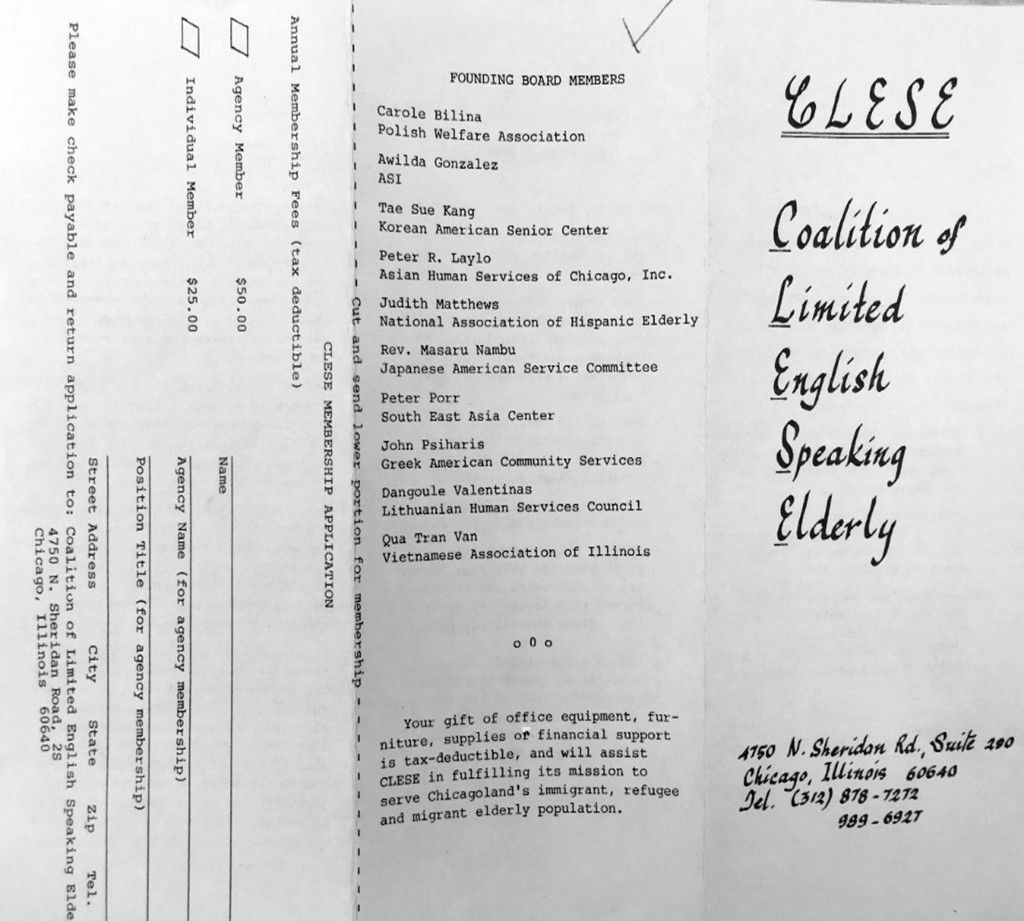
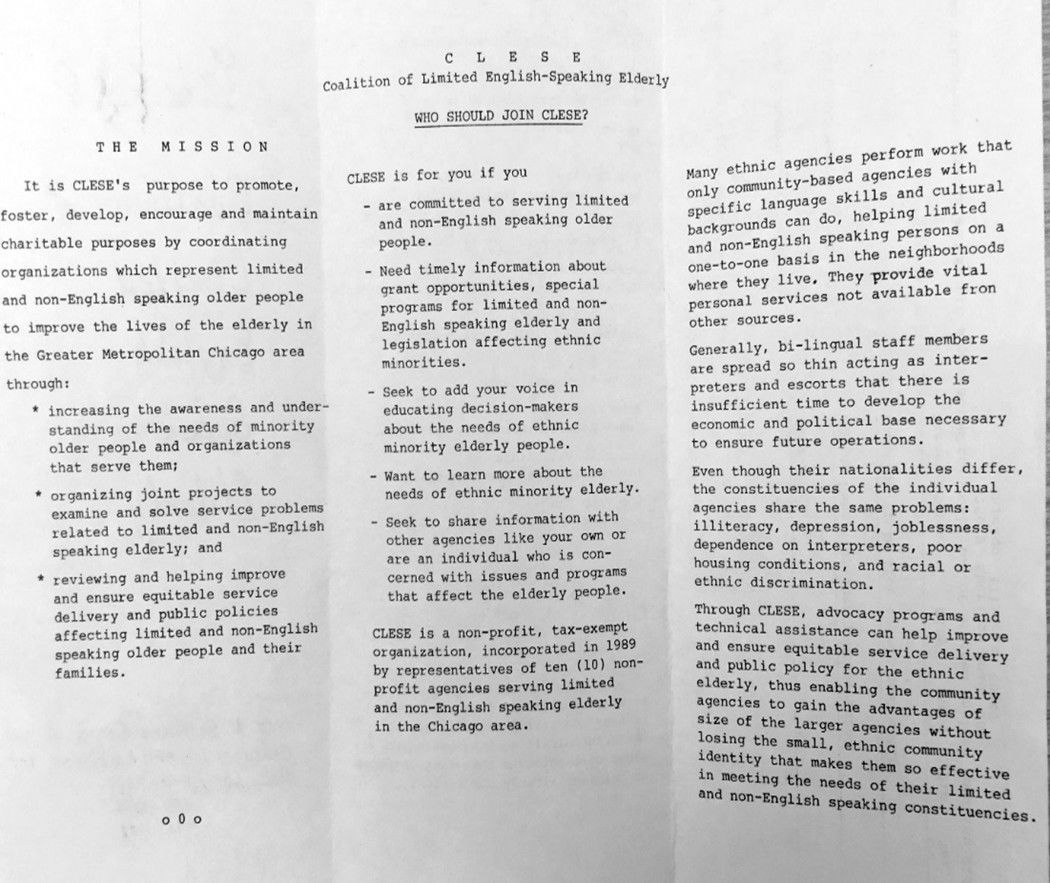
First CLESE brochure. Date unknown. Elaine Thomopoulos collection.
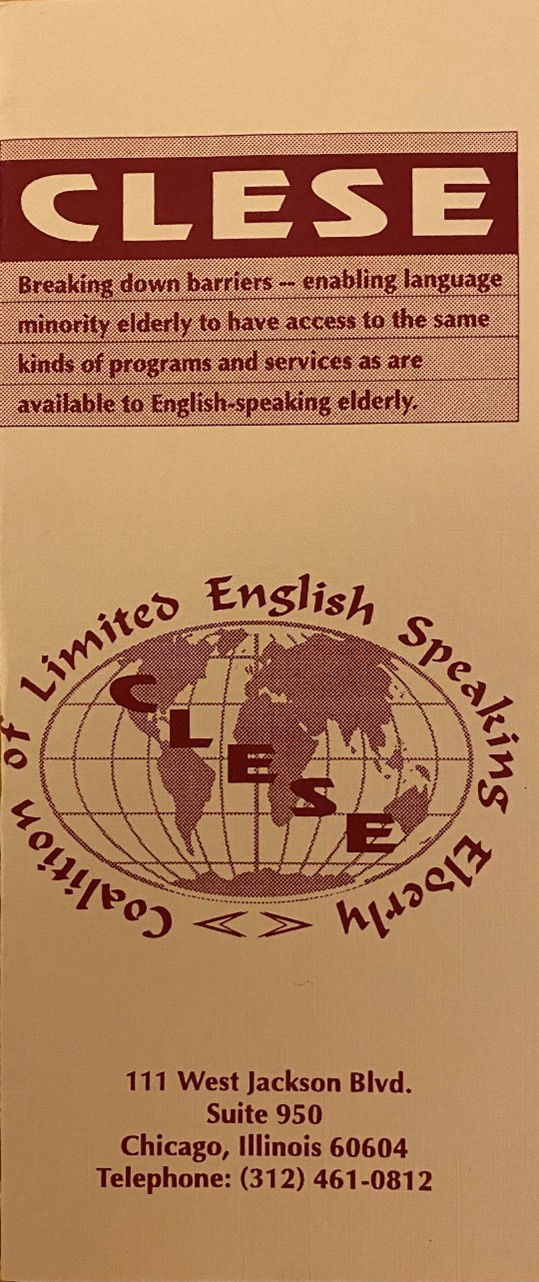
Cover of an early CLESE brochure. Date unknown. Elaine Thomopoulos collection.
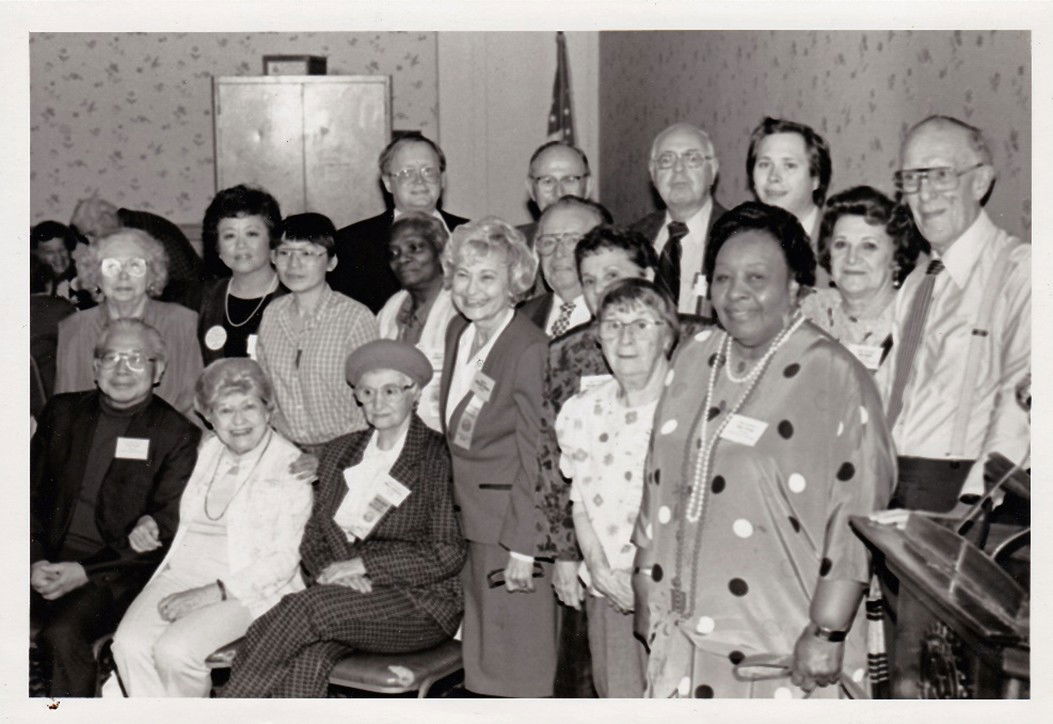
Some of the CLESE delegation to the 1990 Illinois White House Conference on Aging. Pictured (L-R): First row: Yoji Ozaki, unknown, unknown, unknown, unknown, Rebecca Cruz. Second row: Amydelle Shah, Sue Kang, San O, unknown, unknown, unknown, unknown, unknown. Third row: IDOA Director Victor Wirth, unknown, unknown, and John Psiharis. October 1990. John Psiharis collection.
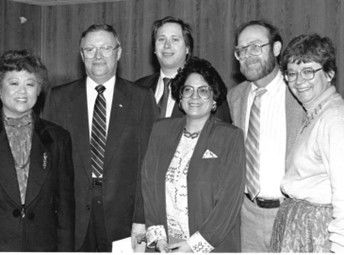
CLESE Executive Committee with Illinois Department on Aging Director Victor Wirth. Pictured (L-R): Sue Kang (president), Victor Wirth, John Psiharis (vice president), Awilda Gonzales (treasurer), Peter Porr (secretary), and C. Jean Blaser (IDOA Community Care Program manager). Circa 1990. John Psiharis collection.
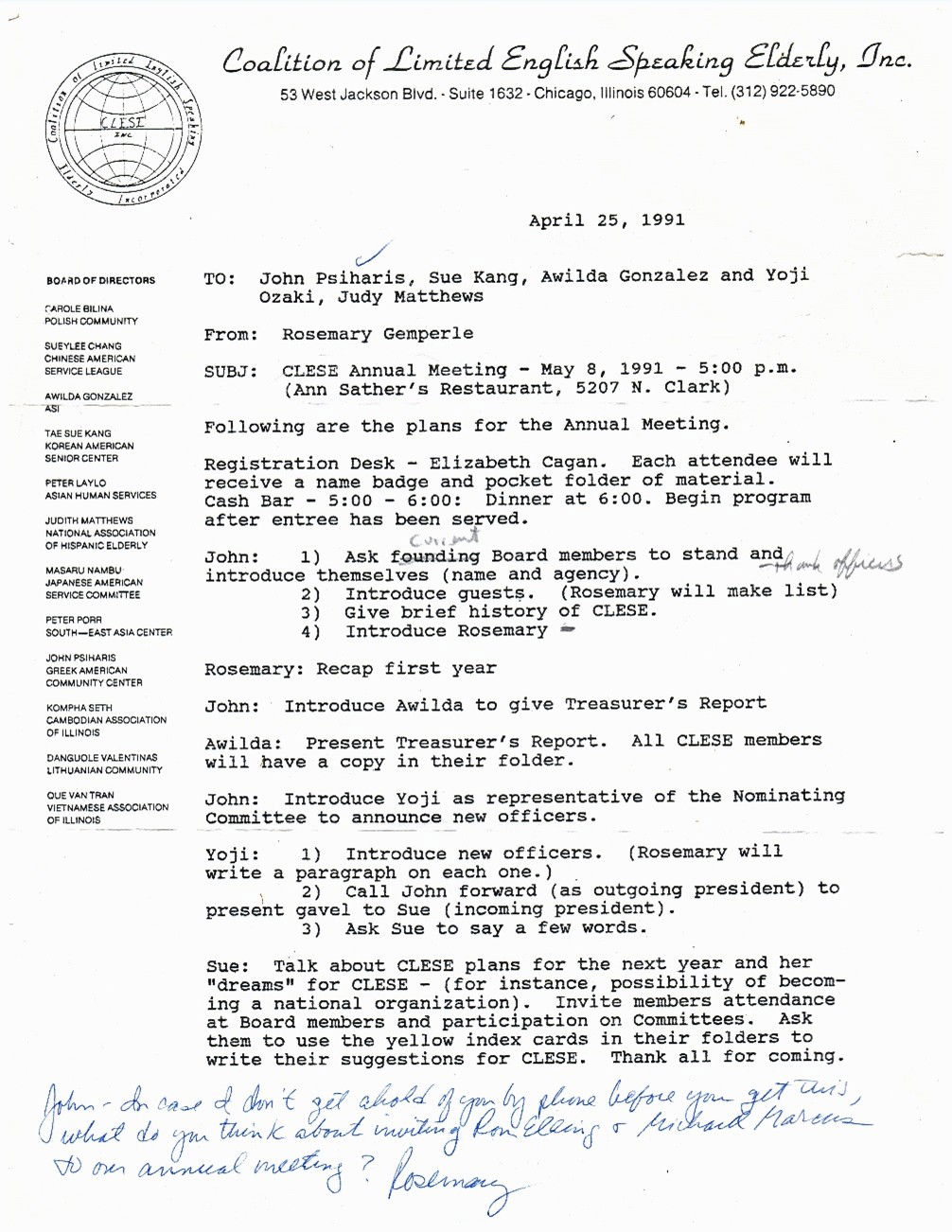
A memo sent to CLESE executive committee members from Rosemary Gemperle outlining the agenda for the 1991 annual meeting. April 25, 1991. The letterhead lists the CLESE board of directors at the time. John Psiharis collection.
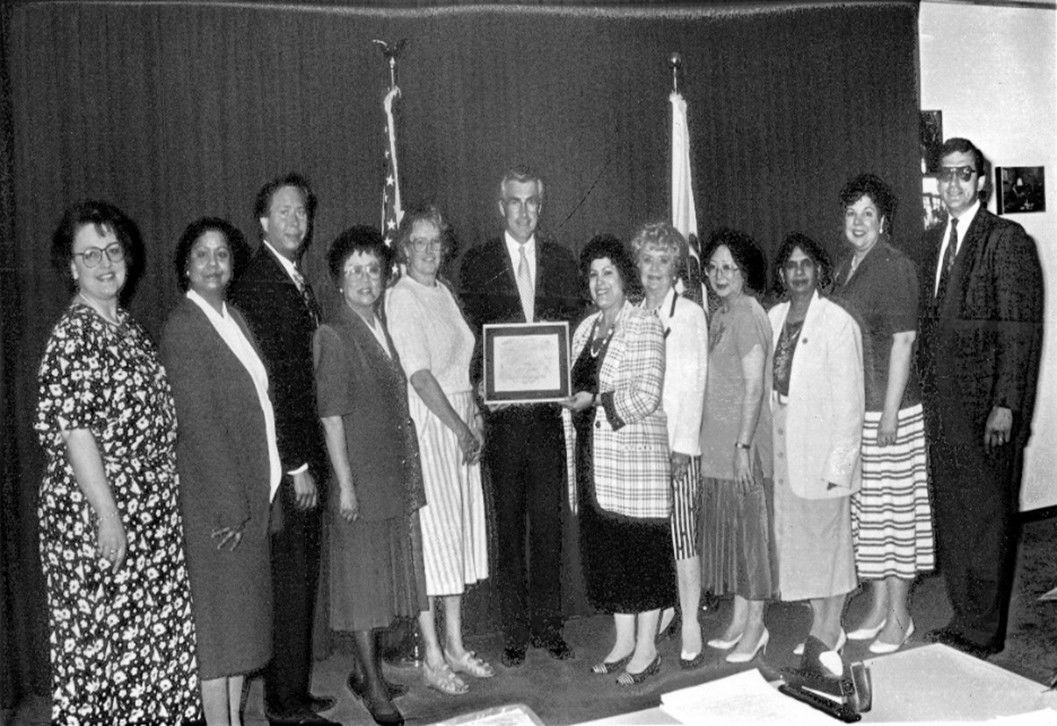
CLESE Board members attend a CCP ethnic providers’ presentation with Illinois Governor Jim Edgar and Illinois Department on Aging Director Maralee Lindley in the Governor’s Office at the James R. Thompson Center State of Illinois Building. Pictured (L-R): Jeanne Elgarawany, Santosh Kumar, John Psiharis, Sue Kang, Rosemary Gemperle, Gov. Edgar, Awilda Gonzalez, Maralee Lindley, Suey-Lee Chang, unknown, Cynthia Yannias, and Michael Chioros. Date unknown. John Psiharis collection.